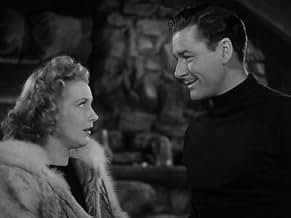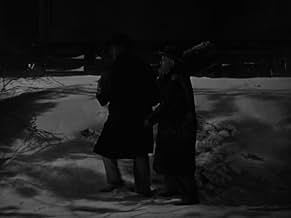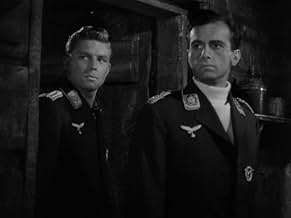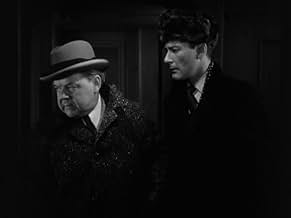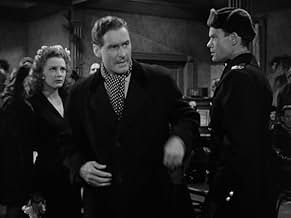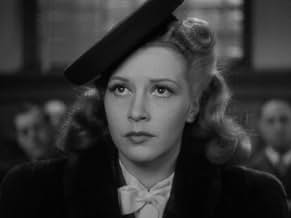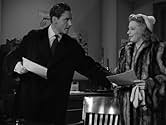IMDb RATING
6.6/10
1.7K
YOUR RATING
A Canadian Mountie of German descent feigns disaffection with his homeland in hopes of infiltrating and thwarting a Nazi sabotage plot.A Canadian Mountie of German descent feigns disaffection with his homeland in hopes of infiltrating and thwarting a Nazi sabotage plot.A Canadian Mountie of German descent feigns disaffection with his homeland in hopes of infiltrating and thwarting a Nazi sabotage plot.
Warren Douglas
- Sergeant
- (scenes deleted)
Richard Allord
- Jochim Preisser
- (uncredited)
John Alvin
- Orderly
- (uncredited)
Robert Ashley
- German Ski Trooper
- (uncredited)
Joe Brooks
- Nazi Prisoner
- (uncredited)
Glen Cavender
- Workman
- (uncredited)
Donald Chaffin
- Nazi Prisoner
- (uncredited)
Noble 'Kid' Chissell
- Lodge Guest
- (uncredited)
Ken Christy
- Winnipeg Police Desk Sergeant
- (uncredited)
Featured reviews
Raoul Walsh, the director of "Northern Pursuit", was a man with impressive credentials during his days in Hollywood. Unfortunately, this film, which kept reminding this viewer of Michael Powell's "49th Parallel", has its moments and will reward the viewer that sticks with it, in some ways.
The plot was typical of the films turned by the big studios during the days of WWII. Although the propaganda in "Northern Pursuit" doesn't strike the viewer as too obvious, it's there all along. The idea of a Royal Mountie, in this case, the dashing Errol Flynn, going after the bad guys have all the elements for a good adventure.
The screen play is ultimately the downfall of the film, although there are hints of greatness, especially on the last part of the film which involves a daring attempt from the head Nazi infiltrator to fly an aircraft with a bomb on board. The locations appear to be real, but we can see the scenes shot in the studio.
Errol Flynn does his job well. Helmut Dantine, playing Keller, the Nazi bad guy, is even better. Gene Lockhart has a pivotal role in the film. Julie Bishop is Errol Flynn's love interest, although there's no obvious chemistry between them.
Raoul Walsh's fans will probably enjoy this film a lot more than the casual viewer.
The plot was typical of the films turned by the big studios during the days of WWII. Although the propaganda in "Northern Pursuit" doesn't strike the viewer as too obvious, it's there all along. The idea of a Royal Mountie, in this case, the dashing Errol Flynn, going after the bad guys have all the elements for a good adventure.
The screen play is ultimately the downfall of the film, although there are hints of greatness, especially on the last part of the film which involves a daring attempt from the head Nazi infiltrator to fly an aircraft with a bomb on board. The locations appear to be real, but we can see the scenes shot in the studio.
Errol Flynn does his job well. Helmut Dantine, playing Keller, the Nazi bad guy, is even better. Gene Lockhart has a pivotal role in the film. Julie Bishop is Errol Flynn's love interest, although there's no obvious chemistry between them.
Raoul Walsh's fans will probably enjoy this film a lot more than the casual viewer.
Basically 'Errol Flynn vs. the Nazis, Round 3' Battleground: Canada
Being myself a Canadian, I was thrilled to find in my 'TCM Spotlight: Errol Flynn Adventures' (five films made during WWII in which Errol Flynn battles the Nazis) a film helmed by one of my favourite American directors of the period, in Raoul Walsh, with Flynn starring as a RCMP officer (typically called 'Mountie') making sure the Nazis can't succeed in their quest to sneak into Canada and, there, create another front in their quest to bring hell on Earth. As a child, I loved his rendition of one of my very favourite heroes (Robin Hood), and lately I quite enjoyed seeing the ill-starred (dying at 50--again in Canada--from a heart attack brought on by chronic alcoholism) native Australian who was perhaps the second-most alluring male thespian of all-time, behind the equally ill-fated Rudolph Valentino, in an audacious TCM 4-pack of outstanding adventure movies, such as 'Captain Blood' and 'The Sea Hawk', and an equally intriguing 4-pack of Westerns he made as his star began to wane.
This doesn't disappoint, as Walsh directs, just like he always does, with an appealing eye and a talent for setting up suspense and excitement. Highly recommended to either fans of Flynn, war films or of cinema from the period.
Being myself a Canadian, I was thrilled to find in my 'TCM Spotlight: Errol Flynn Adventures' (five films made during WWII in which Errol Flynn battles the Nazis) a film helmed by one of my favourite American directors of the period, in Raoul Walsh, with Flynn starring as a RCMP officer (typically called 'Mountie') making sure the Nazis can't succeed in their quest to sneak into Canada and, there, create another front in their quest to bring hell on Earth. As a child, I loved his rendition of one of my very favourite heroes (Robin Hood), and lately I quite enjoyed seeing the ill-starred (dying at 50--again in Canada--from a heart attack brought on by chronic alcoholism) native Australian who was perhaps the second-most alluring male thespian of all-time, behind the equally ill-fated Rudolph Valentino, in an audacious TCM 4-pack of outstanding adventure movies, such as 'Captain Blood' and 'The Sea Hawk', and an equally intriguing 4-pack of Westerns he made as his star began to wane.
This doesn't disappoint, as Walsh directs, just like he always does, with an appealing eye and a talent for setting up suspense and excitement. Highly recommended to either fans of Flynn, war films or of cinema from the period.
NORTHERN PURSUIT has some well photographed chase scenes, supposedly through the snow of the Canadian wilderness, although many of the matching shots are clearly studio-bound. Nevertheless, the weak script and cardboard characters contribute toward reducing it to a standard and slick wartime adventure.
Flynn is a Mountie of German descent, pretending Nazi sympathies in order to spy against Nazis operating in Canada. Helmut Dantine is a force to be reckoned with as the head Nazi--but at times is reduced to a standard "dumb" Nazi who falls too easily for Flynn's deception.
It's all supposed to be taken seriously--unlike DESPERATE JOURNEY which injected a great deal of humor into the Flynn-against-Nazis theme. But with cardboard supporting characters adding nothing to the film's credibility--and a weak script--this is strictly for Flynn fans. Julie Bishop makes no impression whatsoever in the feminine lead.
This was hot stuff back in the 1940s, entertaining as a Saturday afternoon diversion. Now it's simply a non-involving Flynn adventure with some nicely photographed snow chase scenes and nothing else that really matters.
Flynn is a Mountie of German descent, pretending Nazi sympathies in order to spy against Nazis operating in Canada. Helmut Dantine is a force to be reckoned with as the head Nazi--but at times is reduced to a standard "dumb" Nazi who falls too easily for Flynn's deception.
It's all supposed to be taken seriously--unlike DESPERATE JOURNEY which injected a great deal of humor into the Flynn-against-Nazis theme. But with cardboard supporting characters adding nothing to the film's credibility--and a weak script--this is strictly for Flynn fans. Julie Bishop makes no impression whatsoever in the feminine lead.
This was hot stuff back in the 1940s, entertaining as a Saturday afternoon diversion. Now it's simply a non-involving Flynn adventure with some nicely photographed snow chase scenes and nothing else that really matters.
Reading the other IMDb reviews of Northern Pursuit, I began to wonder if the monkey-see-monkey-do reviewers trashing it watched the same movie I did! Or if they watched it at all. This Mounties versus Nazis picture bears little resemblance, as claimed, to The 49th Parallel and even less to Across The Pacific.
From the opening scene with a German submarine breaking through the ice in Hudson Bay to the climatic showdown in a bomber aloft, Northern Pursuit is high-powered excitement all the way. Not surprisingly, with all the high-powered talent Warner Brothers threw into this enjoyable World War II action picture. Top action director Raoul Walsh directs top action star Errol Flynn with a script by popular western writer Frank Gruber and high class novelist William Faulkner. Solid support is provided by Helmut Dantine, reprising his ruthless Nazi officer from Edge Of Darkness (see my review), perky Julie Bishop, Tom Tully, John Ridgely, and Gene Lockhart in another of what was becoming his stock sneaky, Nazi sympathizer role. First rate camera work by Sid Hickox and the smooth editing typical in movies of this era blends studio sets and Idaho ski resort locations with skillfully dovetailed backdrop matting to so successfully convince us we were above the Artic Circle, it gave me a chill at times. The action is propelled along by one Adolphe Deutsch's better scores, enlivened by some input by the great Max Steiner. The story of German descent Mountie Flynn penetrating a Nazi-sympathizing Canadian spy organization co-operating with escaped German prisoners of war maintains suspense and interest throughout. The sharply directed action includes an avalanche, a prison camp breakout, a hair-raising ski chase, and a shoot-out in a mine shaft. Characterization and acting are top notch. Dantine's Nazi Colonel is particularly well realized. This Austrian refugee actor no doubt knew what real-life Nazis were like. He had had to flee his home country because because of his anti-Nazi activities.
While not a classic of the genre like Edge Of Darkness, Nothern Pursuit is a top "A" production war/intrigue thriller, effective WWII propaganda yet enjoyable, exciting, smooth entertainment from Warner Brothers' and Old Hollywood's Golden years.
From the opening scene with a German submarine breaking through the ice in Hudson Bay to the climatic showdown in a bomber aloft, Northern Pursuit is high-powered excitement all the way. Not surprisingly, with all the high-powered talent Warner Brothers threw into this enjoyable World War II action picture. Top action director Raoul Walsh directs top action star Errol Flynn with a script by popular western writer Frank Gruber and high class novelist William Faulkner. Solid support is provided by Helmut Dantine, reprising his ruthless Nazi officer from Edge Of Darkness (see my review), perky Julie Bishop, Tom Tully, John Ridgely, and Gene Lockhart in another of what was becoming his stock sneaky, Nazi sympathizer role. First rate camera work by Sid Hickox and the smooth editing typical in movies of this era blends studio sets and Idaho ski resort locations with skillfully dovetailed backdrop matting to so successfully convince us we were above the Artic Circle, it gave me a chill at times. The action is propelled along by one Adolphe Deutsch's better scores, enlivened by some input by the great Max Steiner. The story of German descent Mountie Flynn penetrating a Nazi-sympathizing Canadian spy organization co-operating with escaped German prisoners of war maintains suspense and interest throughout. The sharply directed action includes an avalanche, a prison camp breakout, a hair-raising ski chase, and a shoot-out in a mine shaft. Characterization and acting are top notch. Dantine's Nazi Colonel is particularly well realized. This Austrian refugee actor no doubt knew what real-life Nazis were like. He had had to flee his home country because because of his anti-Nazi activities.
While not a classic of the genre like Edge Of Darkness, Nothern Pursuit is a top "A" production war/intrigue thriller, effective WWII propaganda yet enjoyable, exciting, smooth entertainment from Warner Brothers' and Old Hollywood's Golden years.
Northern Pursuit (1943)
A solid, serious film that shouts its political message too loudly, but is so unusual, and potentially scary it remains interesting for anyone into WWII films. Truly fascinating is the setting—the north woods of Canada in winter—and the involvement of Native Americans, who side with the Nazis for the simple reason that that means siding against Canada. (This is addressed in some brutal killings partway through.) The key plot idea is that a group of expert Nazis might actually sneak into remote areas of the country to perform acts of sabotage.
The movie audience here is mostly in the United States, to be sure (Canada's population is so small it is always a secondary concern from the studio's point of view). And the leading actor, Errol Flynn, takes on the larger issues well. That is: devotion to good, personal sacrifice to defeat the enemy, and providing an example of moral uncertainty resolving itself as the circumstances become clear. The issues he faces (in Canada) applied to the U.S. equally.
Canada, to be sure, entered the war officially with Great Britain in 1939. But by 1943 the U.S. was also officially fighting. Cooperation between the two neighbors was a given, overall, but they had different national priorities to smooth out. Flynn was so famous at the time, despite (or because of) some personal scandal, he carried the movie.
But it's cobbled together stuff, quasi-propaganda. None of it was shot in Canada, though it's convincing enough. The romance is really almost superfluous, but it gives of course the audience that extra layer to swoon about, briefly. Most viewers will find a lot of this formulaic and rough sledding, but it isn't terrible, and the themes have lasting power.
A solid, serious film that shouts its political message too loudly, but is so unusual, and potentially scary it remains interesting for anyone into WWII films. Truly fascinating is the setting—the north woods of Canada in winter—and the involvement of Native Americans, who side with the Nazis for the simple reason that that means siding against Canada. (This is addressed in some brutal killings partway through.) The key plot idea is that a group of expert Nazis might actually sneak into remote areas of the country to perform acts of sabotage.
The movie audience here is mostly in the United States, to be sure (Canada's population is so small it is always a secondary concern from the studio's point of view). And the leading actor, Errol Flynn, takes on the larger issues well. That is: devotion to good, personal sacrifice to defeat the enemy, and providing an example of moral uncertainty resolving itself as the circumstances become clear. The issues he faces (in Canada) applied to the U.S. equally.
Canada, to be sure, entered the war officially with Great Britain in 1939. But by 1943 the U.S. was also officially fighting. Cooperation between the two neighbors was a given, overall, but they had different national priorities to smooth out. Flynn was so famous at the time, despite (or because of) some personal scandal, he carried the movie.
But it's cobbled together stuff, quasi-propaganda. None of it was shot in Canada, though it's convincing enough. The romance is really almost superfluous, but it gives of course the audience that extra layer to swoon about, briefly. Most viewers will find a lot of this formulaic and rough sledding, but it isn't terrible, and the themes have lasting power.
Did you know
- TriviaErrol Flynn was criticized for playing heroes in World War II movies. Tony Thomas in his book "Errol Flynn: The Spy Who Never Was" states that Flynn had tried to enlist in every branch of the armed services but was rejected as unfit for service on the grounds of his health--he had a heart condition, tuberculosis, malaria and a back problem. He felt he could contribute to America's war effort by appearing in such films as L'ange des ténèbres (1943), Du sang sur la neige (1943), Bombardiers en piqué (1941), Aventures en Birmanie (1945) and Saboteur sans gloire (1944). Reportedly, he was at his most professional and cooperative while working on these movies. Warner Bros. apparently did not discuss the state of his health, as it wished to keep it quiet for fear that it would damage his box-office draw.
- GoofsNear the end the Nazis' plane is shown spiraling over and over in exterior shots, but in shots in the plane's interior it's going straight down, not spinning out of control.
- Quotes
Angus McBain: I have a very derogatory opinion of policeman, in general, and Steve, in particular.
Laura McBain: You're not going to marry him, I am.
Angus McBain: McBain's daughter the wife of a policeman! McBain's daughter stuck in a tradin' post!
Laura McBain: What makes McBain's daughter so wonderful?
Angus McBain: McBain!
- ConnectionsFeatured in Hollywood on Trial (1976)
- SoundtracksThe Bonnie Banks O' Loch Lomond
(ca 1745) (uncredited)
Lyrics by Robert Burns
Played off-screen on piano at the hotel
- How long is Northern Pursuit?Powered by Alexa
Details
Box office
- Budget
- $1,290,000 (estimated)
- Runtime1 hour 33 minutes
- Color
- Aspect ratio
- 1.37 : 1
Contribute to this page
Suggest an edit or add missing content



